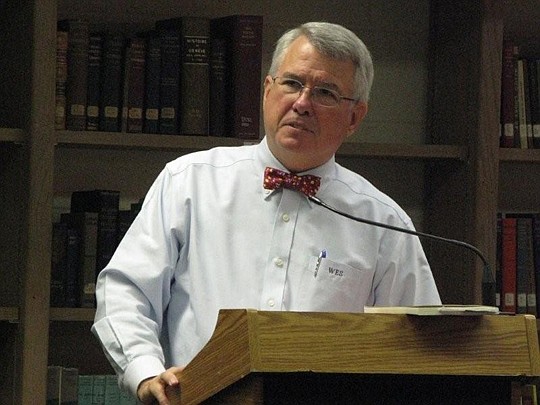
Jacksonville's longtime pension woes will continue into 2014, but not for a lack of trying the past year.
Heading into the budget process midyear, the unfunded liability of the Jacksonville Police and Fire Pension Fund was about $1.7 billion — and rising. The annual contribution for fiscal 2013-14 was $148 million, a significant chunk of the overall $1 billion budget, and a price tag that also continues to rise.
Unfunded liability for the general employees fund is another $700 million.
In May, Mayor Alvin Brown announced the city had come to an agreement with the public safety unions that would save $1.1 billion over 30 years. That also included about $40 million in savings for the fiscal year that began in October.
New employees would be required to contribute 10 percent of their pay to the plan, up from the 7 percent of current employees. And current employees would be capped at 9 percent after salary reductions from past years were restored.
Retirement ages increased to 30 years of service, up from 20 years; the Deferred Retirement Option Program was nixed; and cost of living adjustments were capped, among other changes.
Brown pitched it as a way to ensure financial stability for taxpayers and employees. He used it as a main theme of his budget proposal, saying that adopting the agreement would offset more than $60 million in service cuts part of his budget proposal.
There was pushback.
Council members rejected the idea of taking the idea up when analyzing the budget.
The Florida Times-Union filed a lawsuit against the city and the Police and Fire Pension Fund, saying the discussions were a violation of the state's Sunshine Law.
On Tuesday, Circuit Judge Waddell Wallace agreed with the newspaper. He issued a summary judgment, which keeps officials from having anymore discussions based on those talks.
The Jacksonville Civic Council came out with the position that the plan made progress but "isn't enough" and should affect current employees more, along with other suggestions. The JAX Chamber weeks later followed suit, saying it did not endorse the plan.
Between the two non-endorsements, Brown commissioned an 11-member retirement reform task force led by attorney Bill Scheu to review the agreement. The group met once in mid-July, but before it met again the pension bill was dead.
Council President Bill Gulliford, in his first meeting as council head, discharged the bill from the committee level, forcing a vote. Debate ensued, but council killed the bill with an 11-7 vote. Gulliford said he thought "it's time to move on" and didn't want the council committee reviewing the budget with the pension issue hanging over it.
Brown said the next day that he remained optimistic about reform and later changed the Scheu-led task force to review the pension issues and come up with recommendations.
Pew Charitable Trusts, a Washington, D.C.-based public-policy research organization, stepped in to assist.
Union leaders have said they would wait to see what recommendations are offered before offering an opinion.
Looming still in the courts is whether the so-called 30-year agreement, which lasts until 2030, is valid and the outcome of that dispute also could shape discussions.
In the months since the council rejection, the task force has met to receive input from Pew, members of the public and other groups to form those recommendations, which could then be provided to Brown and then to council.
In its December meeting, it eliminated the idea of a strict defined contribution plan, similar to private sector 401(k) plans. Issuing pension obligation also is out.
So is giving real estate assets to the Police and Fire Pension Fund.
A bill proposed in September by council member Matt Schellenberg would have given the fund the Shipyards, old courthouse, former City Hall building and other assets to offset the unfunded liability.
The ideas that remain will be narrowed further when the task force meets Jan 8.
From there, it will be up to city leaders and fund representatives to come to some form an agreement.
And, if not, council could end up being the final judge of what the plan could look like — and whether many leaders are talking about the need for reform a year from now.
@writerchapman
(904) 356-2466